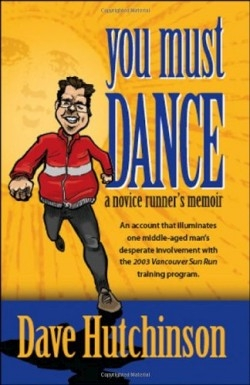You Must DANCE
A Novice Runner's Memoir
“First it was a mother pushing a baby carriage” the author writes. “then it was the eastern European speed walker now it was the postman…”
Passing years and physical inactivity do cruel things to a former athlete like put him behind fellow citizens who aren’t even running but Dave Hutchinson accepts that occasional humiliation is part of the program. Here’s a paper-pusher in the aviation industry (with a fear of flying) who finds himself laid off in the fall of 2002. A sudden need for constructive purpose arrives in the form of a formidably challenging ten-kilometer run.
Hutchinson is a likably quasi-hapless white-collar Dad an extremely Caucasian Vancouverite whose mental life revolves around newspaper columnists television personalities and novels. Wayson Choy’s locally set Jade Peony resonates especially with him. The memoirist’s method is to observe quirks of daily life in a loosely journalistic style ready with a quip when there’s something to react to. The product has personality though the execution is a bit rough—but the same was true of Dave Barry’s early prose.
This task-focused book is purely concerned with systematic progress from total unreadiness to actually running a race of six miles through the unlevel terrain of downtown Vancouver. The memoirist is smitten with the Sun Run’s training plan which he calls “The Document.” The precise training instructions that appear in the newspaper were developed by former Olympian Dr. Doug Clement. The ordered process comforts its ritualized paperwork reminds the memoirist of the interrupted career in aviation manufacturing. The Document’s lead off session couldn’t be less intense: “35 minutes. Run 30 seconds walk 4 minutes and 30 seconds. Do this 7 times.” Peak of training is an hour run; the program effects serious bodily change.
Hutchinson repeatedly imitates former skating champion Toller Cranston’s hand roll gestures in memory of his catching motion back in the glory days as a receiver for his high school football team. To Hutchinson’s amazement his non-exercising wife Shelly begins to train as well. They disagree immediately on whether a practice track should be circled clockwise or counterclockwise and decide to train separately.
Though Hutchinson’s approach is self-deprecating the embarrassments and triumphal moments are strictly physical. If the Hutchinson of 2002 and 2003 harbors deeper worries as one naturally expects of the recently dis-jobbed or even scans the help wanted advertisements he keeps it private. That’s perfectly legitimate but the result is a run by run general repetition which limits the comic possibilities.
The memoirist has his doubts as to whether civilized maturity is the outcome of ceasing enough dangerous activities. He says: “…I quit exercising twenty years ago quit speeding fifteen years ago quit drinking ten years ago quit smoking eight years ago quit flying last year quit the Internet on Friday.” The attraction of You Must Dance is a voice of whimsy which reflects both an engaged interest in society and mild befuddlement at the difficulty of interpersonal relations.
Disclosure: This article is not an endorsement, but a review. The publisher of this book provided free copies of the book and paid a small fee to have their book reviewed by a professional reviewer. Foreword Reviews and Clarion Reviews make no guarantee that the publisher will receive a positive review. Foreword Magazine, Inc. is disclosing this in accordance with the Federal Trade Commission’s 16 CFR, Part 255.

